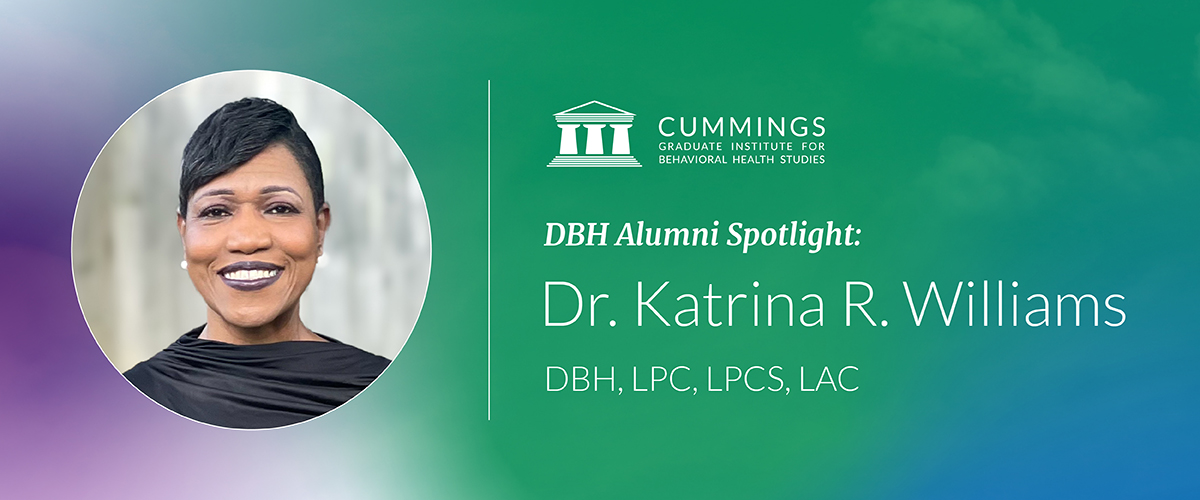 Connecting the Dots: How Dr. Katrina R. Williams is Breaking Cycles and Building Futures
Connecting the Dots: How Dr. Katrina R. Williams is Breaking Cycles and Building Futures
With over three decades of experience in the mental health field, Dr. Katrina R. Williams has built a career grounded in compassion, clinical excellence, and a deep commitment to whole-person care. As the founder and owner of Connecting Dots Counseling Services, established in 2006, she has supported clients across a wide range of settings, from community mental health centers to private practice groups. While her early work focused on children and adolescents, Dr. Williams now specializes in individual and couples therapy for adults navigating depression, anxiety, grief, and emotional stressors. A proud graduate of Cummings Graduate Institute for Behavioral Health Studies (CGI), where she earned her Doctorate in Behavioral Health, Dr. Williams combines academic rigor with a client-centered approach. In this interview, she reflects on her professional journey, her passion for integrated care, and the personal motto that guides her work: “Connecting the dots of life to bring about wholeness.”
How has earning your DBH shaped your approach to behavioral health?
One of the first significant shifts I made during the DBH program was changing the way I referred to those I serve from “clients” to “patients.” This small adjustment stemmed from a powerful insight in one of the introductory courses, where Dr. Nicholas Cummings emphasized that in behavioral health, we are part of the medical field, unlike real estate or financial services, which use the term “clients.” That moment marked a turning point in my perspective on my role as a behavioral health provider. I began approaching each patient’s interaction with a more comprehensive and integrated mindset, ensuring that I considered not only psychological and emotional concerns but also their physical health.
As a result, I revised my intake process to include questions about physical well-being, chronic conditions, and current medications. This shift enabled me to gain a clearer understanding of the full scope of my patients’ concerns and to provide more targeted, effective care. One patient at a time, I began truly treating the whole person. This whole-patient perspective naturally expanded my role into more collaborative care, particularly by opening the door to communication with primary care physicians. In several cases, I have been able to consult with patients’ PCPs to discuss psychotropic medication options, ensuring continuity of care and better patient outcomes.
What are your primary interests in behavioral health, and how do they support your career goals?
Helping the whole person, teaching self-advocacy, and empowering patients to embrace all aspects of themselves have become central to my approach since completing the DBH program. I now see each patient through a more integrated lens, one that considers mental, emotional, physical, and social health as interconnected components of well-being. Through this perspective, I not only address presenting symptoms but also guide patients in understanding how lifestyle, stress, chronic conditions, and even systems of care impact their mental health.
The DBH program emphasized the importance of equipping patients with the tools to advocate for themselves, ask informed questions, and actively participate in their care. This empowerment fosters resilience and long-term improvement. It is no longer about providing support in session—it is about cultivating confidence and independence that extend beyond the therapy sessions.
 Can you share a key moment in your DBH journey that shaped your view of integrated care?
Can you share a key moment in your DBH journey that shaped your view of integrated care?
A memorable moment for me at CGI was when we were introduced to the Six Levels of Collaboration/Integration framework early in the program. It completely shifted how I understood integrated care. I realized I was operating at Level 1: Minimal Collaboration. That awareness gave me a clear direction for growth. Now, as a graduate, I have advanced to Level 2: Basic Collaboration at a Distance, an approach that currently supports my work in private practice. CGI gave me the tools and perspective to evaluate where I was, where I wanted to go, and how to get there. That kind of clarity has been invaluable.
What impact do you hope to make with your DBH in your field and community?
As a Doctor of Behavioral Health, my mission is to positively impact my community through education, awareness, and the implementation of preventive strategies. My culminating project focused on ‘Averting Type 2 Diabetes and Mental Health Stressors on HBCU Campuses,’ a topic deeply connected to both my clinical interests and cultural roots. I’m honored to bring this work full circle by speaking at my alma mater, South Carolina State University, during the 2025 Annual Alumni Convention. My interactive workshop will offer practical tools in stress management, mindfulness, fitness, and nutrition, guiding participants toward a more balanced lifestyle that nurtures both personal well-being and professional success. I look forward to sharing and giving back to the community that helped shape who I am today.
What motivates you to keep pushing forward in integrated behavioral healthcare?
At Connecting Dots Counseling Services, I believe that healing one person has the power to transform an entire family. One of the most inspiring outcomes that I have witnessed is when patients share how their improved mental health not only enhances their lives but also positively reshapes the dynamics within their immediate family—and in many cases, reaches back to influence their families of origin. This ripple effect of healing fuels generational change and is at the heart of what I strive to achieve. I am honored to walk alongside my patients as they break cycles, build healthier relationships, and create lasting change for future generations.
What advice would you give to someone considering the DBH program?
Enrolling in the DBH program at CGI will be one of the most rewarding professional decisions you will make. This journey will not only expand your academic knowledge but also foster profound personal growth and shift the way you view healthcare. I entered the program expecting to sharpen my clinical and leadership skills, but what I didn’t expect was how much it would challenge me to reflect, evolve, and lead with greater intention. One of the most impactful moments for me was realizing how the program’s emphasis on whole-person care allowed me to show up more authentically, not just as a provider, but as a human being. You won’t just learn theory; you will be transformed by it.
Dr. Katrina R. Williams’ journey through the Doctor of Behavioral Health program at Cummings Graduate Institute highlights the transformative power of integrated, whole-person care. With a foundation built on clinical excellence, compassionate leadership, and a commitment to addressing health disparities, she exemplifies what it means to be a behavioral health change agent. Her work in private practice, combined with her outreach in academic and community settings, shows how DBH graduates are equipped to bridge gaps between mental, physical, and social health. Her story is a compelling example of how the DBH degree empowers professionals not only to elevate their clinical practice but also to drive systemic change. At CGI, the DBH program prepares practitioners to lead innovation, shape public health strategies, and advocate for equitable care. Dr. Williams has embraced this charge, using her voice, expertise, and leadership to impact individuals, families, and communities alike. Her journey is both a roadmap and an inspiration, proving that when passion meets purpose, the result is a ripple effect of improvement and transformation.





























